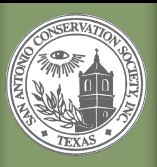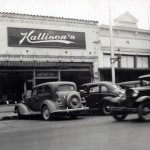San Antonio Conservation Society Award
 The San Antonio Conservation Society honored Nick Kotz with a 2015 Publication Award for The Harness Maker's Dream: Nathan Kallison and the Rise of South Texas (TCU Press, 2013). The Society’s Publication Awards, which take place every other year, publicly recognize the authors of the best recently published books on Texas history.
SACS 2015 Publication Award Recipients
The San Antonio Conservation Society honored Nick Kotz with a 2015 Publication Award for The Harness Maker's Dream: Nathan Kallison and the Rise of South Texas (TCU Press, 2013). The Society’s Publication Awards, which take place every other year, publicly recognize the authors of the best recently published books on Texas history.
SACS 2015 Publication Award Recipients
Texas Institute of Letters announces that The Harness Maker’s Dream is a finalist for their Carr P. Collins Award for Nonfiction.
 The Texas Institute of Letters has announced that The Harness Maker's Dream is a finalist for their Carr P. Collins Award for Nonfiction.
The Texas Institute of Letters has announced that The Harness Maker's Dream is a finalist for their Carr P. Collins Award for Nonfiction. The awards are for works appearing during calendar year 2013. The Institute was founded in 1936 to recognize literary achievement and to promote interest in Texas literature. Authors must have lived in Texas for at least two years or their works must relate to the state. Texas Institute of Letters Website
Writers’ League of Texas Review
 I stand in awe of the Kallison family. From surviving pogroms against Jews in Russia, to moving around the world to the U.S. and then surviving one of the longest Texas droughts (seven years) with their ranch and farm/ranch store intact, this family had an incredible ability to roll with life’s punches and come up standing. In the process they insisted on helping their neighbors at every possible turn, as well as serving the wider community, the city of San Antonio, the cattle and horse industries of Texas, and even the United States, leaving a legacy in many areas.
For those interested in the history of Texas ranching and farming, the Kallisons’ story is a microcosm of the best that can be done, and the factors that contributed to the downturn of the [...]
I stand in awe of the Kallison family. From surviving pogroms against Jews in Russia, to moving around the world to the U.S. and then surviving one of the longest Texas droughts (seven years) with their ranch and farm/ranch store intact, this family had an incredible ability to roll with life’s punches and come up standing. In the process they insisted on helping their neighbors at every possible turn, as well as serving the wider community, the city of San Antonio, the cattle and horse industries of Texas, and even the United States, leaving a legacy in many areas.
For those interested in the history of Texas ranching and farming, the Kallisons’ story is a microcosm of the best that can be done, and the factors that contributed to the downturn of the [...]Renowned Texas Journalist Shares Family History in ‘The Harness Maker’s Dream’
Kotz tells KUT's David Brown, host of the forthcoming daily news show Texas Standard, the story of how Nathan Kallison escaped the Cossacks in Russia to the ghettos of Chicago where he became a harness maker."The automobile was starting to roll on the streets of Chicago," Kotz says. "[Nathan Kallison] had vision, and he saw if there were harnesses and saddles that were still going to be used any place, Texas was the best place to go." And Texas is where Nathan Kallison went. Listen to their interview in the Soundcloud player above or on the KUT.org web site: http://kut.org/post/renowned-texas-journalist-shares-family-history-harness-makers-dream
TEXAS MATTERS

News 4 San Antonio

Nick Kotz – Tamale Festival at Pearl

The remarkable clash of 2 Jewish retail titans

Washington Times Book Review

Immigrant’s life burnished by determination

Back Story: A Pulitzer-Winning Journalist Examines His Own Family

The Jewish Russian harness maker who brought Texas ranching into the 20th century Austin American-Statesman
In the new “The Harness Maker’s Dream,” Nick Kotz writes about his grandfather, Nathan Kallison, a notable San Antonio merchant and rancher.
The story echoes that of many Jewish immigrants at that time. A 17-year-old boy with the skills to turn leather into horse harnesses comes to America in 1890 to escape the Cossacks. But Kallison’s story takes a turn. Within four years, he opens his own store in Chicago’s Jewish West Side. Nine years in, he has moved to San Antonio to open up a store that would cater to ranchers and farmers throughout South Central Texas. Within 20 years, he buys a ranch and the family helps champion the Polled Hereford breed of cattle. He revolutionizes ranching and farming when cattle drives were coming to an end and droughts were common.
[caption id="attachment_93" [...]
 ered the loss of a child, who had servants or took in boarders, even who owned a radio in the early 20th century.
At Newspaperarchives.com, I found a story on published poll tax lists noting that Nathan Kallison was among those who paid for the “right” to vote in Texas in 1911. Spanning decades, I found hundreds of ads for the Kallison’s downtown store and their Bexar County ranch showing the growth of the family’s dual enterprise. Even the local society pages yielded important minutiae from the everyday lives of Nathan and Anna Kallison and their four children: Parties attended; piano recital pieces; debating team topics; roles in school plays; membership in religious, charitable, and community organizations. Together, they gave me a unique picture of who the Kallisons were and what they valued.
For anyone interested in delving into their own family’s past, agencies at all levels of government are digitizing records. It surprised me to discover that in 1927, during Prohibition, the U.S. government indicted my grandfather and Uncle Morris Kallison for violating laws against the production, sale, and transport of alcoholic beverages. I read the court transcript and looked at the photographic evidence against them using digitized National Archives records. I also easily accessed Bexar County, Texas’s amazing collection of online files. Among the land records, licenses, and agreements, I found the 1902 contract for the first parcel of land purchased by my grandparents–who as Jews were denied that right in the Russia of their youth. My grandfather signed his name in Hebrew script; my grandmother, with an “x.”
I now realize that the most important history of our country is not found in the grand events of wars and presidencies, but rather in the everyday lives of our citizens: how they worked hard to support their families; how they coped with hardships, discrimination, and human tragedy; and how they contributed to their own communities and nation. There has never been a better time to research your own family’s past. That is the story only you can tell.
Nick Kotz’s book The Harness Maker's Dream: Nathan Kallison and the Rise of South Texas was published recently. Kotz has received the Pulitzer Prize for National Reporting, the National Magazine Award, and the Robert F. Kennedy Memorial Award, among others.
ered the loss of a child, who had servants or took in boarders, even who owned a radio in the early 20th century.
At Newspaperarchives.com, I found a story on published poll tax lists noting that Nathan Kallison was among those who paid for the “right” to vote in Texas in 1911. Spanning decades, I found hundreds of ads for the Kallison’s downtown store and their Bexar County ranch showing the growth of the family’s dual enterprise. Even the local society pages yielded important minutiae from the everyday lives of Nathan and Anna Kallison and their four children: Parties attended; piano recital pieces; debating team topics; roles in school plays; membership in religious, charitable, and community organizations. Together, they gave me a unique picture of who the Kallisons were and what they valued.
For anyone interested in delving into their own family’s past, agencies at all levels of government are digitizing records. It surprised me to discover that in 1927, during Prohibition, the U.S. government indicted my grandfather and Uncle Morris Kallison for violating laws against the production, sale, and transport of alcoholic beverages. I read the court transcript and looked at the photographic evidence against them using digitized National Archives records. I also easily accessed Bexar County, Texas’s amazing collection of online files. Among the land records, licenses, and agreements, I found the 1902 contract for the first parcel of land purchased by my grandparents–who as Jews were denied that right in the Russia of their youth. My grandfather signed his name in Hebrew script; my grandmother, with an “x.”
I now realize that the most important history of our country is not found in the grand events of wars and presidencies, but rather in the everyday lives of our citizens: how they worked hard to support their families; how they coped with hardships, discrimination, and human tragedy; and how they contributed to their own communities and nation. There has never been a better time to research your own family’s past. That is the story only you can tell.
Nick Kotz’s book The Harness Maker's Dream: Nathan Kallison and the Rise of South Texas was published recently. Kotz has received the Pulitzer Prize for National Reporting, the National Magazine Award, and the Robert F. Kennedy Memorial Award, among others. 
